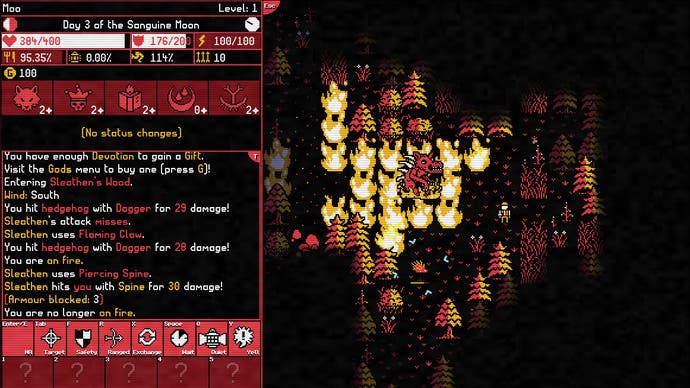Moonring review - a retro RPG offering more than mere nostalgia
Caldera to dream.
The last few months have been bloody brilliant for RPGs, a period stuffed with massive, triple-A titans, gorged on inflated budgets and turgid with years of work from dozens or even hundreds of people, that have competed to devour hours upon hours of my time. And yet for a couple of weeks now I've been consumed by Moonring, another open-world RPG, but one that is largely the work of one man, and available on Steam for free.
Moonring is Fable co-creator Dene Carter's sonnet to the Ultima series, early roguelikes and other RPGs of the 80s. It's blatant nostalgia bait for gamers of a certain age (even older than me, and therefore Very Old Indeed) but designed with modern players in mind, something that is immediately apparent in the presentation. Simple, barely-animated sprites in a handful of colours contrast starkly against an obsidian-black background. Minimalist electronica accompanies your adventures, while the colour palettes swap realism for a range of searing neon schemes - and the music is all terribly trendy dungeon synth. It's all very 80s, but the sort of misrepresented, vapourwave incarnation of the decade peddled to people who weren't born yet. Or were, and just did a lot of drugs at the time.
The moonlit realm of Caldera was once plunged into darkness for decades, until five gods showed up with five moons to light the sky once more. When the inhabitants come of age, they Dream of one of the gods, sort of locking them into worship. Some folks, the protagonist included, are Dreamless and neutral, able to devote themselves to whichever god they please, or none at all. The Archon, a sort of figurehead and arbitrator, is plucked from the ranks of the Dreamless and the current one is getting on a bit, so taking up his mantle is definitely up there as a possible quest goal.
I say possible, because the game plops you into the world with a minimum of fuss and largely leaves you to your own devices. Thankfully, this is where four decades of game evolution come to the rescue, as there is a comprehensive tutorial, a short starter dungeon and extensive automatic note-taking, which leaves you free to play the game without the aid of a notepad and pen. There are point and click mouse controls, but as an old hand at roguelikes, I went straight for the keyboard interface, which is clean and simple. Arrow keys to move, enter for chatting to NPCs, a customisable hotbar and some basic shortcuts, like R for ranged attacks and I for your inventory.
If you've ever played a roguelike, you'll be immediately at home. Everything is turn based, with enemies only moving when you do, and you just move into, or "bump" them to attack. In fact, most of your interaction is just bumping. Open a door? Bump it. Read a book on a shelf? Bump it. Check a wall for a hidden passage? Bump it! Combat is prevented from becoming a purely statistical slugfest thanks to your Poise bar, a sort of buffer of hit points that swiftly regenerates whenever you're not orthogonally adjacent to an enemy. Speed, positioning and judicious use of ranged attacks allows you to minimise the damage that gets through to your actual health, reducing the healing resources you get through.
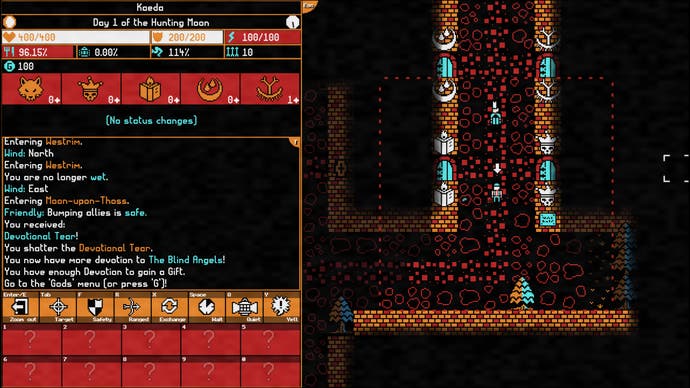
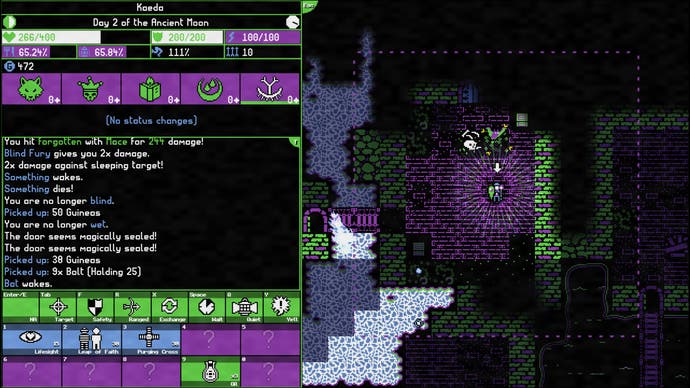
Adding spice to both combat and exploration are gifts from the five gods, which are gained in one of the best character advancement systems I've come across in ages. Eschewing both experience points and skill-based levelling, Moonring instead has a list of Devotional Tasks for each god, which range from just visiting the god's hometown to recovering holy artefacts, gathering a certain number of herbs or defeating enemies while under the influence of a particular status effect. Completing the tasks gets you points to buy active skills, which in turn boosts the stat associated with the god in question. As a Dreamless, you're free to complete Devotional Tasks for all of the gods, mixing and matching skills as you please. You can also choose to devote yourself to one of the gods, which halves the energy cost of their skills and gives you a powerful passive effect, but also imposes a taboo, like being restricted to certain weapons or not being allowed to flee from a fight. Sin against a god often enough and you can be cursed, doubling the cost of their skills.
The game world is split into a fixed overworld map and a zoomed in view that, other than cities and a few other key locations, is procedurally-generated. Dungeons add a roguelike twist in that they reset when you die, leaving you to explore them anew. For the most part, this adds a welcome sense of tension to exploration and combat, as they're mostly single-floor affairs, so you'll never lose a huge amount of progress and the knowledge you've gained of the dungeon's challenges, if not the precise layout, helps speed up the next attempt. It does become a bit tiresome in the larger, multi-level relic dungeons, as a momentary lapse of concentration can make you feel like you've wasted a lot of time, especially if it happens a couple of times in the same dungeon.
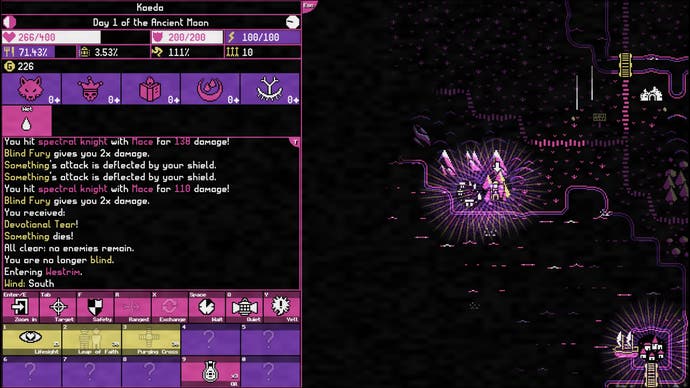
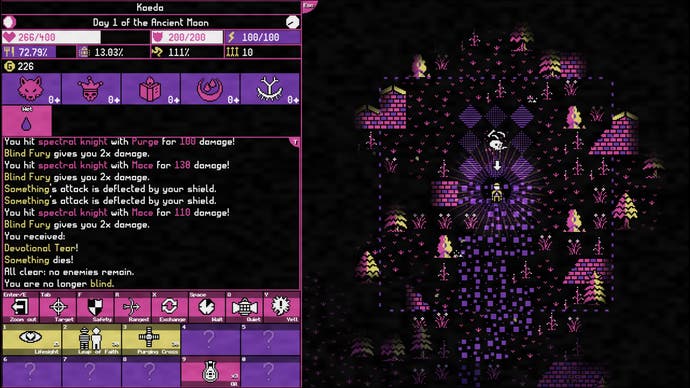
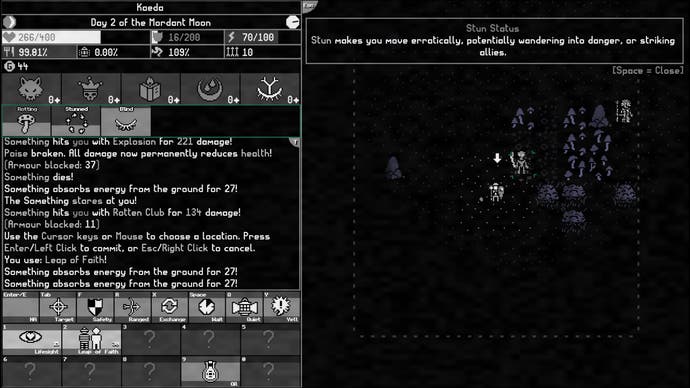
Other than all the bumping, your primary means of interacting with the world is conversing with various NPCs, which is done with a keyword-based text interface. When you speak to an NPC, certain words they say will be highlighted, indicating that they can be pressed further on the subject. While you can type in full sentences including the keyword if you wish, just typing the first few letters of the word will autofill the input box, and helpful reminders of any keywords the NPC has mentioned that you haven't brought up will float around your character. You may be thinking that this sounds like a more cumbersome version of selecting dialogue options, but the twist is that the slightly open-ended nature of the conversation system means that you can bring up topics that the NPC hasn't mentioned. Most of the time you'll just be met with silence, but there are times when you need to give a password, or a specific greeting. There are even rare instances where you need to figure out the right thing to say to an NPC yourself, without the game specifically prompting you.
It's this kind of thing that makes Moonring special. There's a real sense of exploration as you learn about the world of Caldera, its history and the game's various systems and mechanics. The various bits and pieces I've mentioned only scratch the surface and deliberately so, because there's so much joy in discovering it all for yourself. Even with the 40ish hours I've put into the game, I know for a fact that I haven't uncovered all of its secrets. Despite certain NPCs insisting that there's no magic in Caldera, just gifts from the gods and some ancient technology that folks are ignorantly superstitious about, I'm pretty sure that there's a magic system in there, but I've not been able to uncover enough fragments of a single spell. It's a game that has had me breaking into people's houses just to rifle through their bookshelves in search of scraps of lore.
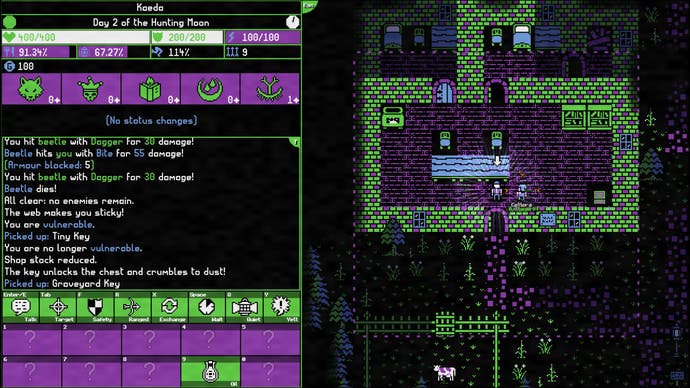
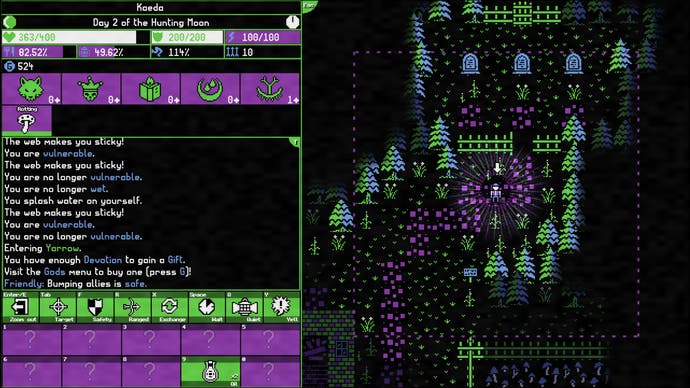
The only thing preventing me from urging you to rush out and download Moonring immediately is that it has some whacking great bugs. While I've not run into very many, one I did encounter caused the game to crash every time I loaded my single, automatically updated save, resulting in me having to erase my game data and start again. Thankfully, the objective- and discovery-led nature of the progression system meant I could get back to where I was pretty quickly. The developer is already on the case and there's already been one round of bug-fixes released, he's also been overwhelmed by the positive response to and popularity of the game, so if you want to ensure a smooth, bug-free experience, it's probably worth waiting a little while and keeping an eye out for updates on the Steam page.
There was a time that RPGs were, with a few exceptions, a niche genre and it's quite amazing to see Baldur's Gate 3 in particular, a turn-based affair dripping with nerdy D&D lore, be this huge triple-A success. Moonring serves as a reminder that RPGs can be epic in scope, innovative and, yes, immersive, without having massive quantities of money, time and people behind them. More than that, Moonring highlights how the joys of discovery, both in finding new games and within the games themselves, is one of this pastime's greatest delights.
